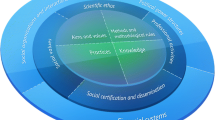Abstract
Scientific thought and the nature of science have been perennial concerns of science teachers and science curriculum developers. That is, the development of students' scientific thinking patterns and understandings of science as a way of knowing have been formally identified as desired outcomes of science instruction since the beginning of this century, and arguably earlier (Lederman 1992). Our desire to help students develop scientific thinking skills and an adequate understanding of the nature of science continues to this day, as is evidenced by the various contemporary reforms in science education (AAAS 1993; National Research Council 1994). Wallis Suchting's comprehensive search for a definition of the nature of scientific thought (Suchting 1995) has significant implications for the aforementioned goals of the science education community. Notwithstanding the almost certain disagreements regarding Suchting's analytical methods, his ultimate conclusion that ‘there is no final, ‘ultimate’ answer to the question of the nature of scientific thought’ should receive careful consideration as it has significant implications for science instruction, curriculum development, research in science education, and the content and focus of science education reform. In particular, these implications relate specifically to the science education community's current conceptions of science process, nature of science, and multiculturalism in science.
Similar content being viewed by others
References
Aikenhead, G.: 1993, ‘Foreword: Multicultural Issues and Perspectives on Science Education’, Science Education 77(6), 659–660.
Aldridge, B.G.: 1992, ‘Project on Scope, Sequence, and Coordination: A New Synthesis for Improving Science Education’, Journal of Science Education and Technology 1(1), 13–21.
American Association for the Advancement of Science.: 1989, Science for All Americans: Project 2061, American Association for the Advancement of Science, Washington, D.C.
American Association for the Advancement of Science.: 1993, Benchmarks for Science Literacy, Oxford University Press, New York.
Atwater, M.M. & Riley, J.T.: 1993, ‘Multicultural Science Education: Perspectives, Definitions, and Research Agenda’, Science Education 77(6), 661–668.
Bronowski, J.: 1956, Science and Human Values, Harper & Row, New York.
Brown, J.S., Collins, A. and Duguid, P.: 1989, ‘Situated Cognition and the Culture of Learning’, Educational Researcher 18(1), 32–42.
Feyerabend, P.: 1975, Against Method, Verso Publishing, London.
Giere, R.N.: 1988, Explaining Science, The University of Chicago Press, Chicago.
Gould, S.J. & Eldredge, N.: 1977, ‘Punctuated Equilibria: The Tempo and Mode of Evolution Reconsidered’, Paleobiology 3(1), 115–151.
Hodson, D.: 1993, ‘In Search of a Rationale for Multicultural Science Education’, Science Education 77(6), 685–711.
House, E.R.: 1991, ‘Realism in Research’, Educational Researcher 20(6), 2–9, 25.
Kuhn, T.S.: 1962, The Structure of Scientific Revolutions, The University of Chicago Press, Chicago.
Lakatos, I.: 1970, ‘Falsification and the Methodology of Scientific Research Programs’, in I. Lakatos & A. Musgrave (eds.), Criticism and the Growth of Knowledge, Cambridge University Press, Cambridge.
Laudan, L.: 1977, Progress and Its Problems, University of California Press, Berkeley.
Lederman, N.G.: 1992, ‘Students' and Teachers' Conceptions of the Nature of Science: A Review of the Research’, Journal of Research in Science Teaching 29(4), 331–359.
Levins, R., and Lewontin, R.:1985, The Dialectical Biologist, Harvard University Press, Cambridge, MA.
Mayr, E.: 1982, The Growth of Biological Thought, The Belknap Press of Harvard University Press, Cambridge, MA.
Mayr, E.: 1988, Toward a New Philosophy of Biology: Observations of an Evolutionist, The Belknap Press of Harvard University Press, Cambridge, MA.
National Research Council.: 1994, National Science Education Standards (Draft), National Academy Press, Washington, D.C.
National Science Teachers Association.: 1982, Science-Technology-Society: Science Education of the 1980s, National Science Teachers Association, Washington, D.C.
National Science Teachers Association.: 1993, Scope, Sequence, and Coordination of Secondary School Science: The Content Core, National Science Teachers Association, Washington, D.C.
Perry, W.: 1970, Forms of Intellectual and Ethical Development in the College Years: A Scheme, Holt, Rinehart and Winston, New York.
Popper, K.R.: 1959, The Logic of Scientific Discovery, Harper & Row, New York.
Shymansky, J.A., Kyle, W.C. & Alport, J.M.: 1983, ‘The Effects of New Science Curricula on Student Performance’, Journal of Research in Science Teaching 20(5), 387–404.
Stanley, W.B. & Brickhouse, N.W.: 1994, ‘Multiculturalism, Universalism, and Science Education’, Science Education 78(4), 387–398.
Suchting, W.A.: 1995, ‘The Nature of Scientific Thought’, Science & Education 4(1), 1–22.
Welch, W.W.: 1979, ‘Twenty Years of Science Curriculum Developments: A Look Back’. In D.C. Berliner (ed.), Review of Research in Education (vol. 7, pages 282–306), AERA, Washington, D.C.
Wolpert, L.: 1993, The Unnatural Nature of Science, Harvard University Press, Cambridge, MA
Author information
Authors and Affiliations
Rights and permissions
About this article
Cite this article
Lederman, N.G. Suchting on the nature of scientific thought: Are we anchoring curricula in quicksand?. Sci Educ 4, 371–377 (1995). https://doi.org/10.1007/BF00487758
Issue Date:
DOI: https://doi.org/10.1007/BF00487758




